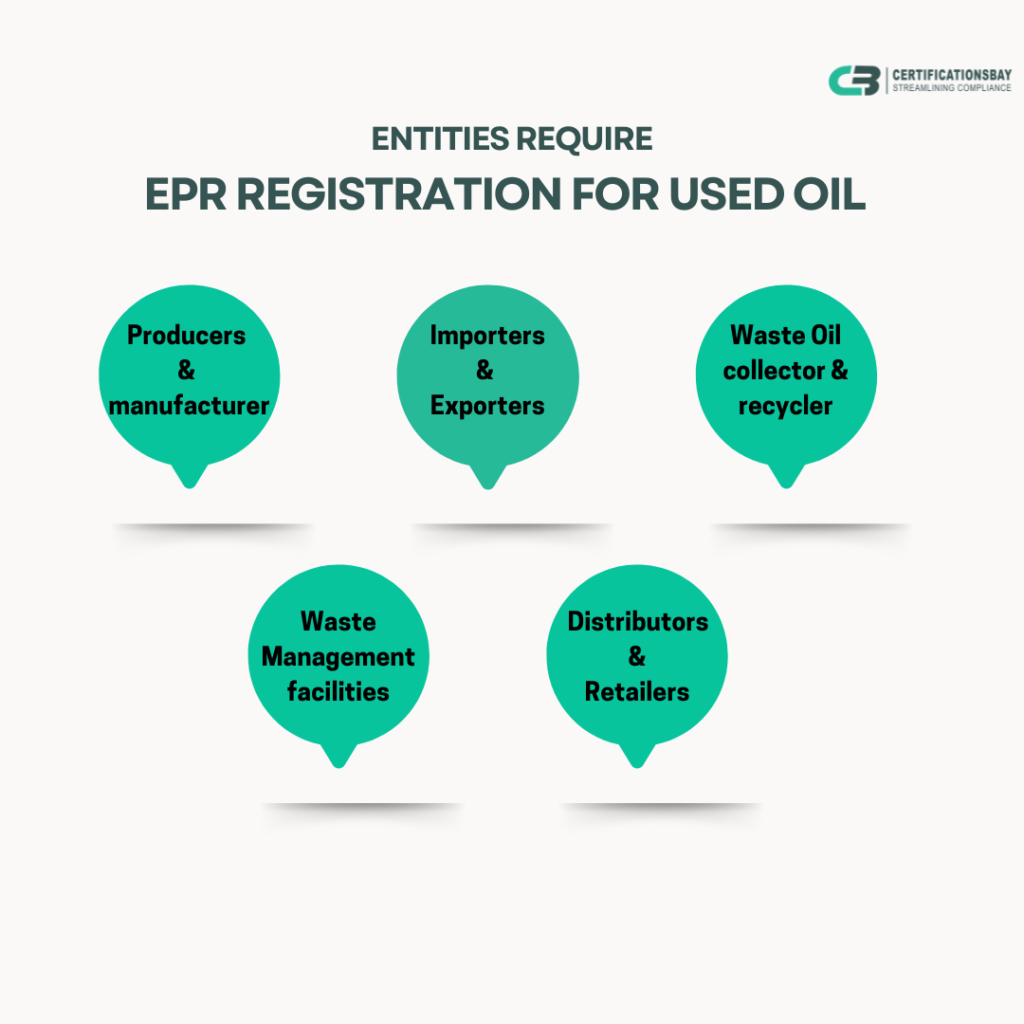
The Extended Producer Responsibility (EPR) framework for used oil is a structured approach aimed at ensuring that entities involved in the production, recycling, importation, and collection of used oil meet their environmental obligations. This article explores key aspects of the EPR framework, focusing on the sign-up process, responsibilities, and regulatory compliance under the EPR for used oil.
Sign-Up Process for EPR Activities
During the EPR sign-up process, entities must choose among various activity types, including Producer, Recycler, Collection Agent, or Used Oil Importer. If an entity is involved in multiple activities under the same GST number, it must select all relevant activities during sign-up. However, if different GST numbers are involved, separate sign-ups are required. The benefit of selecting multiple entities during the initial sign-up is the generation of a single set of login credentials, while each entity’s operations remain distinct within the EPR portal.
Login and Registration Requirements
An organization with multiple entities sharing a common GST number can register all entities simultaneously during the sign-up process. This streamlines access by using the same credentials across different profiles, yet maintains the integrity of each entity’s transactions, registration, and module. Additionally, entities under proprietorship or partnership structures must upload the PAN of the authorized person during sign-up.
Recycling and Re-Refining of Used Oil
Recycling and re-refining of used oil are critical components of the EPR for used oil. Recycling refers to the process of re-refining used oil to produce base oil or lubrication oil or recovering energy from used oil in an environmentally sound manner. Re-refining involves removing impurities from used oil to produce high-quality base oil or lubrication oil, adhering to the guidelines set by the Central Pollution Control Board (CPCB).
Fulfilling EPR Targets
Producers cannot directly meet their EPR targets by collecting used oil and handing it over to recyclers. Instead, they must purchase EPR certificates from registered recyclers. These certificates serve as proof of fulfilling EPR obligations, and producers may enter agreements with recyclers to transfer certificates according to their business models.
Extended Producer Responsibility Certificates
The EPR certificate is a critical element in the EPR for used oil framework. Producers fulfill their EPR obligations by purchasing or transferring EPR certificates from registered recyclers via the CPCB’s EPR portal. The quantity eligible for the generation of EPR certificates is determined by a formula that considers the quantity of the end product recovered, the conversion factor (CF) as determined by CPCB, and the weightage (WP) assigned to the specific end product.
Regulatory Considerations for Producers and Recyclers
The import of used oil is strictly regulated under the EPR framework and is permitted only for re-refining purposes. Recyclers are required to produce base oil that meets the quality standards set by the Bureau of Indian Standards (BIS), which directly influences the conversion factor for EPR certificate eligibility. Producers, on the other hand, must procure EPR certificates from recyclers, although they may also opt to procure re-refined base oil to contribute to the circular economy.
Fees and Environmental Compensation
The EPR framework outlines specific registration fees for entities involved in the production, recycling, importation, and collection of used oil. The fees vary based on the scale of operations, as detailed in the tables provided for producers, importers, recyclers, and collection agents. Additionally, an annual processing charge, equal to 25% of the registration fee, is required.
Environmental Compensation (EC) is levied on entities that fail to fulfill their EPR obligations or engage in fraudulent activities related to EPR certificates. The CPCB also regulates the volatility of EPR certificate prices by setting minimum and maximum exchange prices, which are tied to the EC charges.
Trading and Validity of EPR Certificates
EPR certificates are not tradable between registered producers or used oil importers. Producers can only purchase certificates up to their current year’s liability, plus any leftover liability from previous years, and an additional 10%. The validity of these certificates is two years from the end of the financial year in which they were generated, after which they are automatically deleted or archived in the EPR portal.
Compliance and Adjustments
Producers must carefully monitor their EPR targets, which are initially calculated based on the total amount of oil placed in the market. These targets can be dynamically adjusted during the registration process when the producer’s supply chain involves other registered producers.
Conclusion
The EPR framework for used oil is a comprehensive regulatory mechanism designed to ensure that all entities involved in the lifecycle of used oil—from production to recycling—adhere to stringent environmental standards. Understanding and complying with these regulations is crucial for entities to meet their EPR obligations and contribute to sustainable environmental practices.
